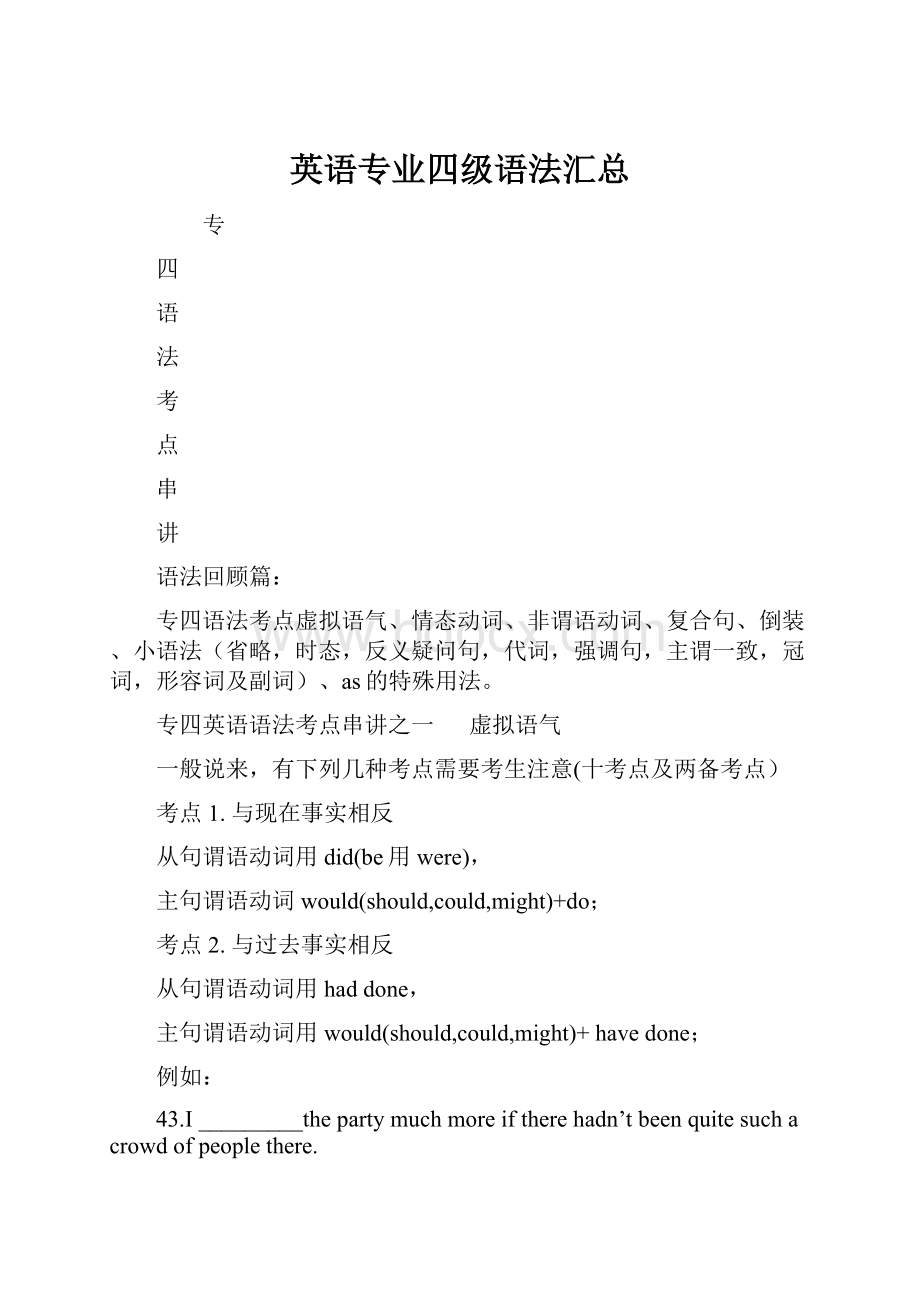英语专业四级语法汇总.docx
《英语专业四级语法汇总.docx》由会员分享,可在线阅读,更多相关《英语专业四级语法汇总.docx(59页珍藏版)》请在冰豆网上搜索。

英语专业四级语法汇总
专
四
语
法
考
点
串
讲
语法回顾篇:
专四语法考点虚拟语气、情态动词、非谓语动词、复合句、倒装、小语法(省略,时态,反义疑问句,代词,强调句,主谓一致,冠词,形容词及副词)、as的特殊用法。
专四英语语法考点串讲之一 虚拟语气
一般说来,有下列几种考点需要考生注意(十考点及两备考点)
考点1.与现在事实相反
从句谓语动词用did(be用were),
主句谓语动词would(should,could,might)+do;
考点2.与过去事实相反
从句谓语动词用haddone,
主句谓语动词用would(should,could,might)+havedone;
例如:
43.I_________thepartymuchmoreiftherehadn’tbeenquitesuchacrowdofpeoplethere.
A.wouldenjoy B.willhaveenjoyed
C.wouldhaveenjoyed D.willbeenjoying
49.Allofuswouldhaveenjoyedthepartymuchmoreifthere_________quitesuchacrowdofpeoplethere.
A.weren’t B.hasn’tbeen C.hadn’tbeen D.wouldn’t
考点3.与将来事实相反,
从句谓语动词用:
did(should+do或were+todo),
主句谓语动词用:
would(should,could,might)+do。
例如:
43.Ifyourcar___anyattentionduringthefirst12months,takeittoanauthorizeddealer.(08年)
• A.shallneed C.wouldneed
• B.shouldneed D.willneed
考点4.时态的交叉现象,也就是主句与从句的动作发生在不同的时间段
例如:
Ifyouhadgonetoseethedoctor,youwouldbeallrightnow.你要是早去看病,你现在就没事了。
考点5.虚拟条件句if可以省略,但从句的语序要用到装,即将were,had或should移至主语的前面形成倒装,但否定词not不前移。
例如:
65.___,hewouldnothaverecoveredsoquickly.(05年)
•A. Hadn'thebeentakengoodcareof
•B. Hadhenotbeentakengoodcareof
•C. Hadnothebeentakengoodcareof
•D. Hadhebeennottakengoodcareof
考点6.insist(一个坚持);ordercommand(两道命令);suggest,advise,propose(三条建议);ask,require,request,demand(四点要求)及相应的名词的从句,谓语要使用:
should+动词原形或动词原形
例如:
58. Itwasrecommendedthatpassengers___smokeduringtheflight.(04年)
•A. not B.neednot C.couldnot D.wouldnot
考点7.Itis+advisable,essentialimportant,,imperative,incredible,等等相关的从句,
谓语要使用:
should+动词原形或动词原形
例如:
46.Itisimperativethatstudents____theirtermpapersontime.(04年)
•A.handin B.wouldhandin
•C.havetohandin D.handedin
考点8.itishigh(about)timethat的结构中,从句使用一般过去式
例如:
54It’shightimewe__cuttingdowntherainforests.(06年)
Astopped Bhadtostop Cshallstop Dstop
考点9.muchas尽管,虽然,引导让步状语从句,从句中用wouldhavedone表示假设,可以是说话人的语气变得十分委婉,真诚。
例如:
52.Muchas____,Icouldn’tlendhimthemoneybecauseIsimplydidn’thavethatmuchsparecash.(99年)
A.Iwouldhavelikedto B.I wouldliketohave
C.Ishouldhavetolike D.I shouldhavelikedto
考点10.ifonly表示要是…就好了相当与wish,asif/asthough的用法。
与现在事实相反:
动词过去式
与过去事实相反:
had+done
与将来事实相反:
could/would+do
例如:
52.IfonlyI__playtheguitaraswellasyou!
(06年)
Awould Bcould Cshould Dmight
备考1.wouldrather或wouldsooner后跟宾语从句,从句中使用一般过去式或过去完成式分别表示对现在或过去的虚拟,表示“宁愿某人作某事”
例如:
Themanagerwouldratherhisdaughter____inthesameofficenow.
A.hadnotworked B.nottowork
C.doesnotwork D.didnotwork
备考2.用于lest,forfearthat引导的状语从句。
在lest,forfearthat等引导的状语从句中,通常用"(should+)原形动词"这一虚拟语气形式
例如:
Themadmanwasputinthesoft-paddedcelllesthe________himself.
A.injure B.hadinjured C.injured D.wouldinjure
专四语法考点串讲之二 情态动词
考试中,情态动词部分重点测试以下内容:
(1)情态动词+行为动词完成式
(2)某些情态动词的特殊用法
1.musthavev-ed
musthavev-ed表示推测过去某事“一定”发生了。
其否定形式为:
can’t/couldn’thavev-ed,表示过去不可能发生某事。
例如:
Sincetheditchisfullofwater,itmusthaverainedlastnight.
2.couldhavev-ed表示推测过去某动作“很可能”发生了
3.may/mighthavev-ed表示推测过去某事“也许”发生了.may比might表示的可能性在说话人看来稍大些。
4.oughtto/shouldhavev-ed和oughtnotto/shouldn’thavev-ed用于对已发生的情况表示“责备”、“不满”,分别表示“本应该…”和“本不应该…”表示应完成而未完成的动作用于完成时中的否定句,表示不应完成但已做的动作
5.needn’thavev-ed表示过去做了某事,但没有做的必要,意为“本没必要…”。
例如:
Youneedn’thavewakenmeup;Idon’thavetogotoworktoday.
注意:
didnotneedtodo动作并没发生
例:
Ididn’tneedtogetupearly,soIgotupuntil9a.m.
*特殊用法
(1)can‘t表示“不可能”,maynot表示“不可以”,mustn’t(mustnot)表示“不许可禁止”,needn't(neednot)表示“不必”,darenot+动词原形表示“不敢”
(2)must表推测的否定现在式用can’t,过去式用couldn’t
(3)MayI/we…?
这一类疑问句的肯定回答为Yes,please.或Certainly;否定回答为Pleasedon’t.或No,youmustn’t.例如:
“Mayweleavenow?
”“No,youmustn’t.Youhaven’tfinishedyourhomeworkyet.”
(4)needI/we…?
这一类疑问句的肯定回答为Yes,wemust; 否定回答为needn’t
(5)在回答must引起的问题时,如果是否定的答复,不能用mustn’t,而要用needn’t或don’thaveto
(6)May/mightaswell may……but….(表转折)
(7)Iwishtogohomewithyou,mayI?
(8)Dohelpyourselftohavefruit,won’tyou/willyou?
(表示一种委婉的请求)
*情态动词短语的使用
wouldliketodo…
wouldratherdo…
wouldrather+从句
wouldprefertodo...
hadbetterdo...
*情态动词:
will(愿意),shall(将),must(必须),can,may,would,should(应该),might,could,oughtto,usedto(过去常常),need(需要),dare(竟敢),haveto(不得不)
*dare,need也可作一般(行为)动词
*情态动词一般用法的否定:
mustn’t 不准,禁止,不要 can’t(couldn’t) 不会;不能;
may(might)not 不可以;
needn’t 没必要(=don’thaveto)
usednot/usedn’tto或didn’tuseto… 过去不…
darenot 不敢
*情态动词推测用法
Must一定,肯定 can’t(couldn’t)不可能
Can/could 可能 Can’t(couldn’t)不可能
may/might“可能,也许” May(might)not也许不,可能不
*推断用法
should/oughtto“按理应当,应该是; shouldn’t 不应该(=oughtnotto)
*情态动词+have+done结构表示对过去动作的推测
1.musthavedone:
对过去的肯定推测,译作“一定做了…”,只能用于肯定句中。
其否定形式为can’t/couldn’t havedone
Itmusthaverainedlastnight,fortheroadwasquitemuddy
2.can/couldhavedone:
对过去的可能性推测,译作“可能做了…”。
只能用疑问句中
Can/Couldhehavesaidit?
他可能说过那种话吗?
3.may/mighthavev-ed:
对过去的可能性推测,译作“也许能,有可能。
It’stoolate.Ithinkhemayhavegonetobed.
*情态动词+have+过去分词结构表示轻微的责备和后悔
肯定:
过去应该做而没有做;
否定:
过去不该(不必)做而做了。
⑴might/could+have+过去分词:
“本来可以,早就应该”
(只用于肯定句,且不能用may,can)
Youcouldhavetoldmeyouweregoingtobelate!
.你应当早告诉我你会晚到的!
⑵should(oughtto)+have+过去分词:
“本应”(没做)
shouldnot(oughtnotto)+have+过去分词:
“本不该”(做了)
Youshouldnothavehandedinyourcompositionyesterdaymorning.你本不应把作文交了。
Youshouldhavebeenhereearlier.你应该早点来才对。
3.needn't+have+过去分词:
“本不必,本不须”(need只用于否定句)(做了)
Youneedn'thavewokenherup.It'sonlysix.你其实不必叫醒她。
现在才六点。
注意:
didnotneedtodo动作并没发生(没做)
例:
Ididn’tneedtogetupearly,soIgotupuntil9a.m.
*八大注意点
1.在以could,might表示征询对方意见或表示请求时,回答应相应使用can,may
—MightIwatchTVaftersupper?
—Yes,you________.
A.may B.must C.might D.can
2.MayI/we…?
这一类疑问句的肯定回答为Yes,please.或Certainly;否定回答为Pleasedon’t.或No,youmustn’t.例如:
“Mayweleavenow?
”“No,youmustn’t.Youhaven’tfinishedyourhomeworkyet.”
3.needI/we…?
这一类疑问句的肯定回答为Yes,wemust; 否定回答为needn’t
4.在回答must引起的问题时,肯定must;如果是否定的答复,不能用mustn’t,而要用needn’t或don’thaveto
5.Iwishtogohomewithyou,mayI?
6.Dohelpyourselftohavefruit,won’tyou/willyou?
(表示一种委婉的请求)
7.Shall用于第三人称,表示许可,允许
8.let’sdothisjob,shallwe?
Letusdothisjob,willyou?
9.should也表示惊讶的语气,
例如:
Iwasshockedthatsheshouldhavesaidsuchathingtoyou.(她竟然对你说那样的话,…)
*四大特殊结构
1.may/mightaswell+动词原形”意为“最好,满可以,倒不如”,相当于hadbetter
Youmayaswelldoitatonce.
2.maywell+动词原形”是一种常见的结构,意为“(完全)能,很可能”
Hemaywellbeproudofhisson.
他大可为儿子高兴。
3.cannot…too/enough表示“无论怎么……也不算过分”、“越……越好”
Youcannotbetoocareful.
4.hadbetter 最好
Youhadbetternotwakemeupwhenyoucomein.
*两大类区别:
一、表示能力:
can, beableto
beableto能用于各种时态。
can/could只能表示现在或过去的能力
*was/wereableto:
“设法做成某事”
相当于 managedtodosth succeededindoingsth.
二、usedto和would的区别
usedto过去常常(但现在已无此习惯,would无此含义)
Heusedtodrinkbeer,nowhedrinkswine.他过去喝啤酒,现在喝白酒。
would只能用来谈动作;usedto用来谈动作或状态(可与be,live,like,stay等状态动词连用):
Hewouldgetupearlywhenhelivedinthecountry.他住在乡下时总是早起。
Weusedtoliveinasmalltown.(不能用would)
Beusedtodoingsth:
习惯于做某事
should的用法
1.(shall的过去式,表示过去将来)将
Wehopedthatweshouldbeabletodothat.
我们希望我们能这样做。
*2.(表示语气较强的假设)万一,竟然
Ifthecarshouldbreakdownontheway,youwouldhavetowalkback.
万一汽车中途抛锚,你就得走回来。
*3.(表示可能性、推测、推论或期待)可能,该
Sheshouldbehereanyminute.
她该马上就到。
Dinnershouldbereadybynow.
此刻晚饭应该做好了。
4.(表示义务、责任)应该,应当
Youshoulddoasshesays.
你应当照她说的去做。
Heshouldworkharder.
他应该更加努力。
Youshouldhelpyourmotherwiththehousework.
你应该帮你母亲做家务。
5